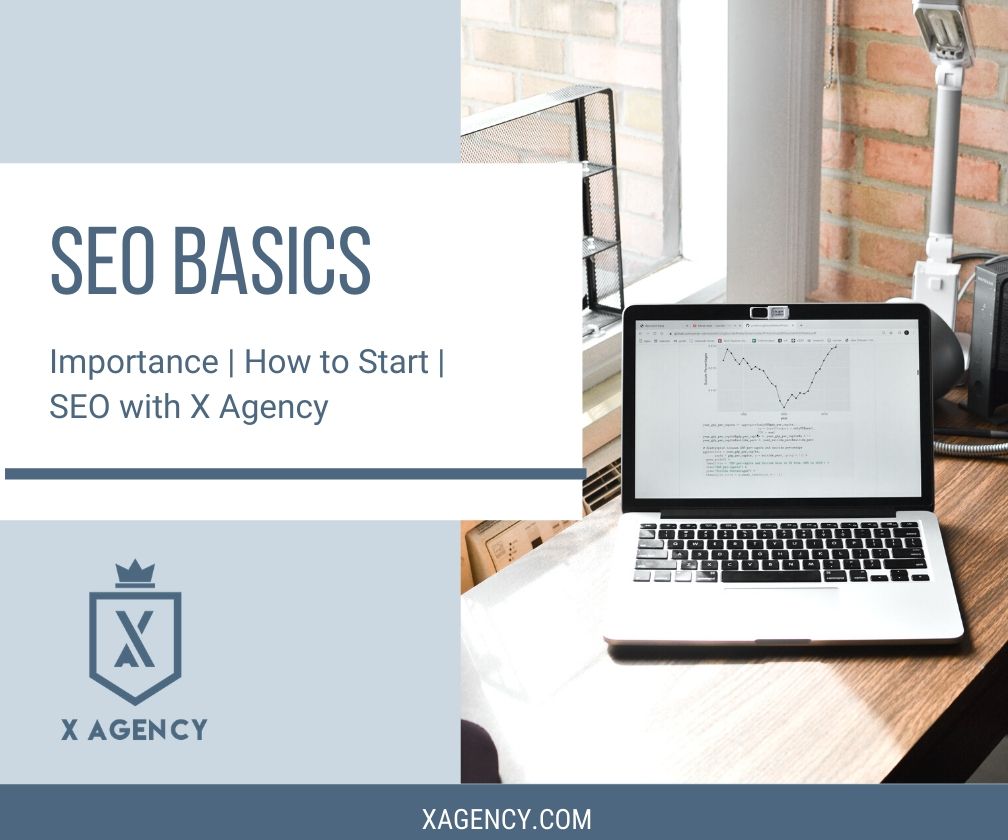Search Engine Optimization Basics
Today, we’re going to cover the basics:
— What is SEO
— Why Is SEO Important
— How To Start SEO

What Is SEO?
Search engine optimization—SEO—is a marketing discipline focused on growing visibility in organic, non-paid, search engine results. It is one of the main contributors to a successful search engine marketing strategy, which is one of the pillars to digital marketing.
Ok, so really, what is it? SEO is the process of optimizing your website, its content and your overall online presence to increase visibility so that users find it valuable and search engines present your information high on the organic listings of search results pages.
The three core elements of SEO are technical, on-page, and off-page optimization.
- Technical SEO is anything that affects the visibility, accessibility and performance of your site to search engines—from indexing and site architecture to page speed and url structure.
- On-page SEO is all things content, both user facing and search engine facing.
- Off-page SEO is the collection of factors that contribute to your site’s authority, relevance and trust, such as link building, social media, reviews and more.
The goal while implementing SEO is to make your website readable, usable and desirable to both users and search engines, making this marketing function a combination of both technical and creative positioning.
SEO is a marketing function that is the analytical implementation of technical elements, content and outreach to make your website highly valued and easily usable to both users and search engines.
The three core elements of SEO are technical, on-page and off-page.
SEO continues to grow in importance and should be included as an important part of your digital marketing strategy.
WHY IS SEO IMPORTANT?
SEO is a necessary part of any company’s growth strategy—especially as more and more consumers look to the web for information throughout the purchasing cycle and to make the actual purchases themselves. Here are five key reasons why SEO is vital to your digital marketing strategy:
– Search engine traffic
– Necessary for first page SERPs
– Builds brand trust and credibility
– Relatively cheap to implement
– It’s measurable
- Search engine traffic. A 2019 study of online B2C businesses showed that on average 53% of web traffic comes from organic search. Paid advertising, social media, and other platforms are all ways to generate traffic, however, the majority is driven through search engines.
- Necessary for first page SERPs. Of the 10 organic positions available on the first page, the first position has an average CTR of 31.7% and is 10x more likely to receive a click thru than the tenth. As to the pages after that…well, do you know anyone who browses the second page on a regular basis?
- Builds brand trust and credibility. When done correctly, SEO is a beautiful circle of feeding both the search engine beast and the ever-present need to satisfy the demands of consumers. Growing your brand presence across multiple channels and referrals from sites with high authority contributes to the value search engines give your site, rewarding you with more SERP listings. All of which contributes to consumer awareness and confidence in your brand.
- Relatively cheap to implement. There is certainly a time and expertise element that is necessary for good SEO, as well as monitoring and development. However, unlike advertising’s need for continued funding to stay active, strong SEO tactics like good content can keep serving you—and even grow—over time.
- It’s measurable. A core element to any good marketing campaign is measurement. While the effects of good SEO are typically a slower, long term play, the KPIs are still measurable and allow marketers to draw conclusions about their campaign, consumer patterns, and the overall web environment.
HOW TO START SEO
For any large scale site, your first step for tackling SEO is most likely going to be hiring a consulting agency. Let’s be honest—the in-depth intricacies of technical SEO are best left to the specialists. In fact, even Google agrees you should consider hiring an SEO specialist for best in class strategies. However, there are definite “low hanging fruits” that lie in on-page and off-page SEO that you can certainly get a jump start on for smaller, more manageable sites. We’ll share a few of these basic SEO tips here:
Make sure search engines can find you. Simply head on over to Google, and type in your company’s name. If you don’t come up, this could possibly point to some indexing or crawlability issues that you’re going to want cleared up with your tech team ASAP. If key landing pages within your site are also not appearing when searched for, you may want to go ahead and find a trusted source to complete a technical SEO audit.
Know your brand. This, of course, is a given at the beginning of any marketing campaign. Know your brand, your audience, competitors, etc. Establishing clear company goals and product specific goals provides a natural source to derive your SEO objectives and propel your tactics.
Establish your targeted keywords. If you have a good idea of who your audience is, who you’re selling your goods and services to, then you should have a pretty good idea of your baseline keywords as well. Then, you can use tools like Ubersuggest to get basic search trend information and related queries to target. Noting what works for competitors is also a good step here.
Optimize on-page content for search engines and users. There are no tricks here. While you shouldn’t be including any hidden content just for a search engine’s sake, there are aspects to web pages that include content a user may not notice, or know that it is giving important SEO value. However, these are interpreted by the search engine with the end user in mind. Namely, page titles, meta descriptions, and H1 tags. A page title is a succinct phrase that describes the web page, and it is shown both at the top of a browser window and as the title of a return on the SERP page. A meta description is the short paragraph describing the contents of the webpage that is shown as the teaser description of a return on SERPs. Be sure that all of your key landing pages have unique, keyword rich descriptions for each of these elements.
While not necessarily as important, another easy on-page content win is for all of your image files to be named with relevant keywords, as well as completed alt descriptions. This enriched the overall informational value of your page, as well as gives your page the opportunity to show up in image search results. All of these factors help search engines know the contents of your web page in order to serve the best information to users.
Create valuable content. We’ve all heard it, “content is king.” Why has this saying become a cliché? Because it’s still true. As search engines continue to evolve and present higher intelligence algorithms, their end goal remains the same—to serve the best returns for a user’s search. This means brands need to be anticipating what users want and how they’re going to look for it. By creating relevant, interesting, readable (or viewable), and reliable content, you are conveying to users and search engines alike that you offer high authority information that will fulfill the user’s desire.
Send users to your website. You can’t spend valuable time and resources to create great content and then let it just sit there. Off-page SEO tactics are offensive actions to send traffic to your site, showing search engines that consumers show up to use the information shared, i.e., it’s valuable and relevant. You can begin your link building strategies via social media marketing and PR initiatives. The goal is for other websites with a high domain authority to be sending backlinks to your website, which is a positive value signal for search engines. Paid digital advertising campaigns also send traffic to your site, increasing visitor volume and contributing to perceived value.
And that’s just the beginning! Monitoring and measuring your SEO campaigns is highly beneficial. Not only in simple keywords and SERP listings tracking, but also taking note of click thrus, bounce rate, pages visited, engagement, conversions and overall industry search trends—to name a few.
While knowing and understanding where your site currently stands with SEO in terms of on-page and off-page health are necessary SEO audit factors, we’d like to reiterate the importance of a technical audit when it comes to implementing some truly kick-ass SEO strategies. After all, fantastic content isn’t going to do you much good if your robots.txt file is directing search crawlers to ignore the very pages you’ve spent time cultivating. There are a number of services that provide automated audit tools for identifying big picture problems, but it does take the skilled eye of an SEO professional to identify the culprit and craft the solution. Issues aside, optimizing your site technically for SEO could be exactly what you need to surpass competitors, project your brand to the top and drive more sales.
SEO WITH X AGENCY
X Agency SEO for ecommerce businesses is a full service program that starts with a complete site and brand audit. We dig into the technical issues and opportunities your site presents, both on mobile and desktop, and recommend updates to ensure your business is highly competitive in search engine rankings. Furthermore, we conduct in-depth competitor and industry research to supply a holistic content strategy targeting user intent, which also cultivates your brand. Our goal is to bring your site to its highest potential for being found by search engines and users, fill your top funnel with qualified traffic to decrease cost per acquisition, ensure a valuable user experience, and ultimately drive conversions to increase channel profits.
